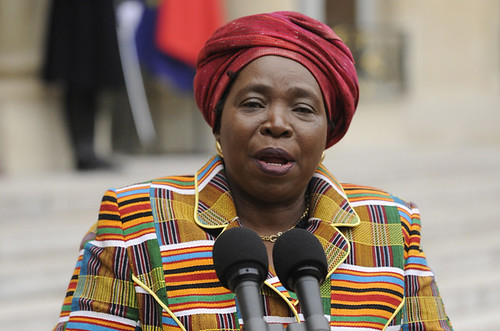
Dr. Nkosazana Dlamini-Zuma, the African Union Commission Chair. She attended a two-day conference on African agriculture in Addis Ababa., a photo by Pan-African News Wire File Photos on Flickr.
Willing but weak: Questions swirl about AU peacekeeping
January 31, 2014
SINIKKA TARVAINEN
While African Union leaders were meeting to discuss the conflict in the Central African Republic on Thursday, the European Union was preparing to send troops there - once again pushing the question of whether Africa can handle its own crises to the forefront. The EU troops are to reinforce more than 3,500 African Union and 1,600 French troops already in the country, which has for months been gripped by inter-religious violence.
The AU summit had initially been due to focus on food security. Instead, the humanitarian crises in CAR and South Sudan have pushed conflict resolution to the top of the agenda. "The fact that these humanitarian tragedies are unfolding in the two countries at a time when we are talking about 'African Renaissance' must be painful to all of us," Ethiopian Foreign Minister Tedros Adhanom said.
South Sudanese President Salva Kiir showed little faith in the AU's ability to help his country, sending only his deputy to the summit and saying, through a spokesman, that he had "more important issues to attend to." "We have agreed on the need for Africa to take charge of itself," said Guinean President Alpha Conde, who chairs the AU's Peace and Security Council.
But analysts say the AU has already made a serious effort in CAR - where it is seeking EU and US financing to send more peacekeepers - and in South Sudan, where it has helped broker a cease-fire. "African countries and regional organisations are struggling to stabilise the continent and to deal with ongoing crises," Paul Simon Handy, a conflict specialist with the Pretoria-based Institute for Strategic Studies, told dpa.
"But their troops may not have the training and equipment that are required" for operations such as the one in CAR, he added. The country slid into chaos in March after the president was overthrown. AU and French forces have been unable to stop violence between Muslim fighters and Christian vigilante groups. Thousands have been killed and a million displaced.
In South Sudan, sporadic fighting is reported despite a cease-fire brokered January 23 by the East African bloc IGAD, which works together with the AU. Thousands have been killed and more than 700,000 displaced. Human rights groups report widespread inter-ethnic violence. In the 1990s, most large African-led peace operations were conducted by regional organisations. The 2002 creation of the AU, the successor to the Organisation of African Unity, opened a new era, with major missions in Burundi, the Sudanese region of Darfur, and Somalia.
African troops also participate in UN peace operations - currently in South Sudan, Mali and the Democratic Republic of Congo. AU military missions have been criticised as inefficient, internally divided and under-funded, with most of the financing coming from Western donors. "The AU is able to deploy troops, but not really to perform well on the ground," says Thierry Vircoulon, a Central Africa analyst with the think tank International Crisis Group.
Burundian troops, for instance, were not able to organise their transport to CAR without US help, he told dpa. AU troops also lost credibility over allegations that Chadian soldiers had sided with fellow Muslims in CAR inter-religious violence. "The robust military intervention by France in CAR has affected the AU, creating a wait-and-see attitude and delaying the consolidation" of its military intervention, Alfredo Tjiurimo Hengari from the South African Institute of International Affairs said in a telephone interview.
The AU was due to send 6,000 troops to CAR, but it has fallen well short of that goal so far. "It is difficult to find adequately trained troops, especially when there is demand for them in other peace operations as well," Handy said. The idea of an AU rapid deployment standby force, first raised after the Rwandan genocide in 1994, has failed to materialise. But Handy says it is now in the making, "with progress on the regional level."
Despite their shortcomings, analysts see AU forces as having played a significant role in keeping violence in CAR in check. The AU has been even more successful in Somalia, where it has helped the government repel al-Shabaab radical Islamists. Hengari attributes the success partly to AU military co-operation with Ethiopia and Kenya, which have a strong interest in maintaining peace in their eastern neighbour.
"The AU has come a long way" in helping to resolve conflicts on the continent, Handy says. However, its biggest successes have been in political mediation, he added. It has also done well at imposing sanctions after changes of government it considered illegal.
"The OAU or AU have been present in every crisis on the continent, although sometimes on a low-key level," Handy said.
Copyright Deutsche Presse-Agentur, 2014
No comments:
Post a Comment